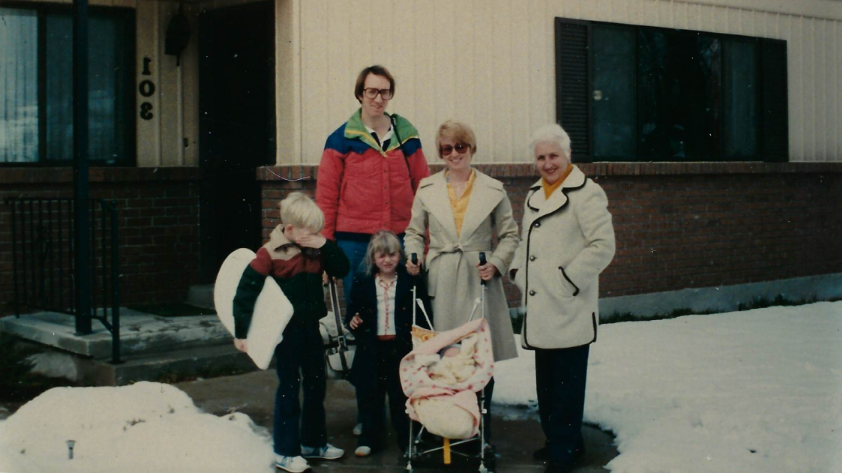Life Sentences: The Letter explores grief, trauma and lingering effects
May 7, 2024, 5:00 AM | Updated: 10:54 am

Rasmussen family in the 70s. Left to right back row: David, Jordan, and DeAnn Rasmussen, and Dora Richins. Front row: Lisa and Chad Rasmussen (in the stroller). (Rasmussen family photo)
(Rasmussen family photo)
MILLCREEK, Utah — As time passed after the murders detailed in season 2 of “The Letter,” the families of Buddy Booth and Jordan Rasmussen continued to wrangle with their grief and trauma.
Those grief struggles and how the families adjusted to them form the basis of the 4th episode of season 2 of “The Letter” podcast.
The Letter: Exploring grief and trauma
The man who killed 24-year-old Buddy Booth didn’t know him. He didn’t know he had a wife and two young daughters.
And that man had no idea that killing the delivery driver, who stumbled on the murder of Jordan Rasmussen the morning of March 5, 1982, would rob Buddy Booth’s family of the most stable thing in their lives.
Buddy’s widow Carla was just 23 and hadn’t been working as she cared for their four-month-old and 4-year-old daughters. Now, she was solely responsible for the survival of their little family.
Carla was overwhelmed with grief and uncertainty. She couldn’t bring herself to return to the apartment they’d shared.
In addition to trying to figure out where they’d live and how they’d manage financially, Carla faced almost constant questions from her 4-year-old daughter, Norma.
“She always wondered where her dad was,” Carla said weeping, “why he wasn’t coming home. And it took me a long time …before I even said anything to her.”
How to explain loss to a child
Carla didn’t know how to explain death to a four-year-old. So she just avoided it.
“My parents would say, ‘Carla, you really need to take her to the gravesite and let her see her dad’,” she recalled. “And I said, ‘She’s not ready.’”
But about a year after Buddy’s death, the questions were getting harder not to answer. And Norma was getting older. So Carla decided to take her parents’ advice.
They walked to the spot in the grass where a headstone bore her dad’s name. Carla pointed at it and said, “This is where Daddy is.”
“She kept looking around,” Carla said, breaking down in tears. “Looking for him is what she was doing. And I sat by the graves for a little bit. (But) she wouldn’t sit down. She just kept looking, waiting for him to come.”
Norma was confused.
And nothing Carla said seemed to help. So she decided they needed to leave. She took her daughter’s hand and started to lead her to the car.
Norma tried to tug her hand free.
“And she goes ‘Mama, wait! Wait, Mama, wait. I want to see my dad’,” Carla said through tears. “And I told her that her dad lives here. …And he’s in the ground.”
Norma broke down into sobs.
“And that broke her heart,” Carla said. “She just cried and cried… I felt it was a mistake to bring her because I knew then she wasn’t ready for it.”
Carla cries remembering how distressed Norma was. It lasted for months.
“She was angry with me for a while – thinking I took her away from her dad,” Carla said.
But Carla wouldn’t realize the full impact of losing her husband for many years.
Trauma and grief: dueling life sentences detailed in The Letter
Michael Moore’s decision to kill Buddy didn’t just leave her children without a father.
It set in motion other changes that would bring new pain and compounding trauma.
And Carla Maas wasn’t alone. DeAnn Rasmussen was navigating the complexities of grief and motherhood too.

A young Jordan Rasmussen in the early 1980s. (Rasmussen family photo.)
“I remember the day I woke up after the funeral,” DeAnn said. “That was when it really hit me – to wake up in the morning and the first thing you notice is your heart is racing. And you think, did I dream that? Or is it real, and then reality would hit, and [I] didn’t want to get out of bed. I just remember [thinking], ‘Life just seems so empty’ — I thought, ‘I just don’t want to go on living. What’s there to live for?’ But then I’d think of David, Lisa, and Chad. And I thought, ‘I have to be here for them.’”
DeAnn said even joyful moments, such as her children’s accomplishments were tinged with sadness – and sometimes darker feelings.
“Sometimes I would get angry…if the kids did something, got an award at school, or did something that the parents should be there, I would just be angry that…they couldn’t have their Dad there,” she said. “It was hard not feeling sorry for them. And so you just wanted to give them things.”
Like Carla, she knew her children were struggling with grief too. But she wasn’t sure how to talk about it either.
So they didn’t.
“They just kind of kept it in,” she said. “I think I failed them. I probably should have brought it out.”
A different kind of life sentence
But as Carla Maas and DeAnn Rasmussen were still trying to find a way to navigate the isolating reality of grief and motherhood, Michael Moore was preparing for his first parole hearing.
And the question that loomed over everything was – did the man who left two young families without fathers understand the damage he’d done?













